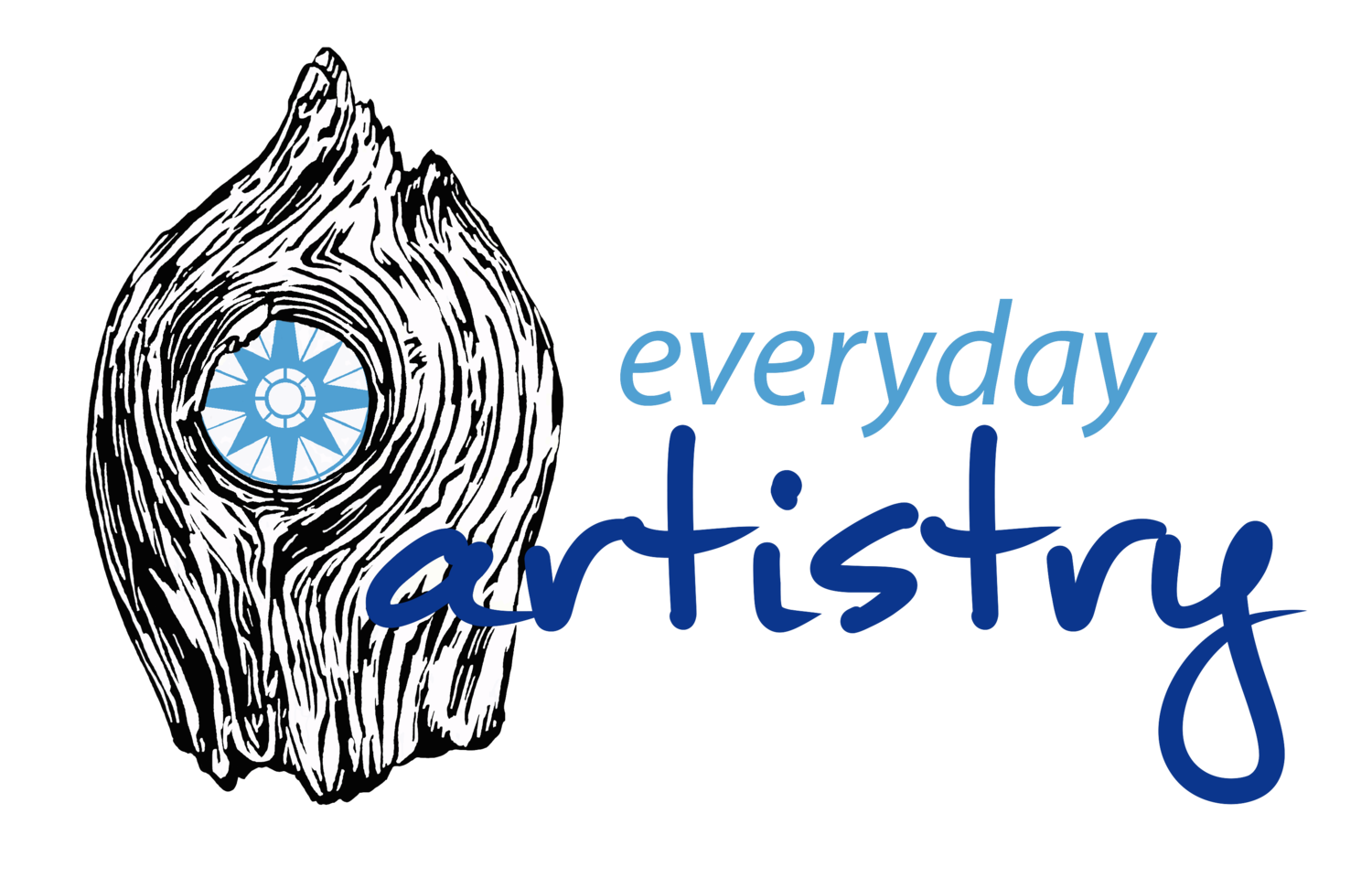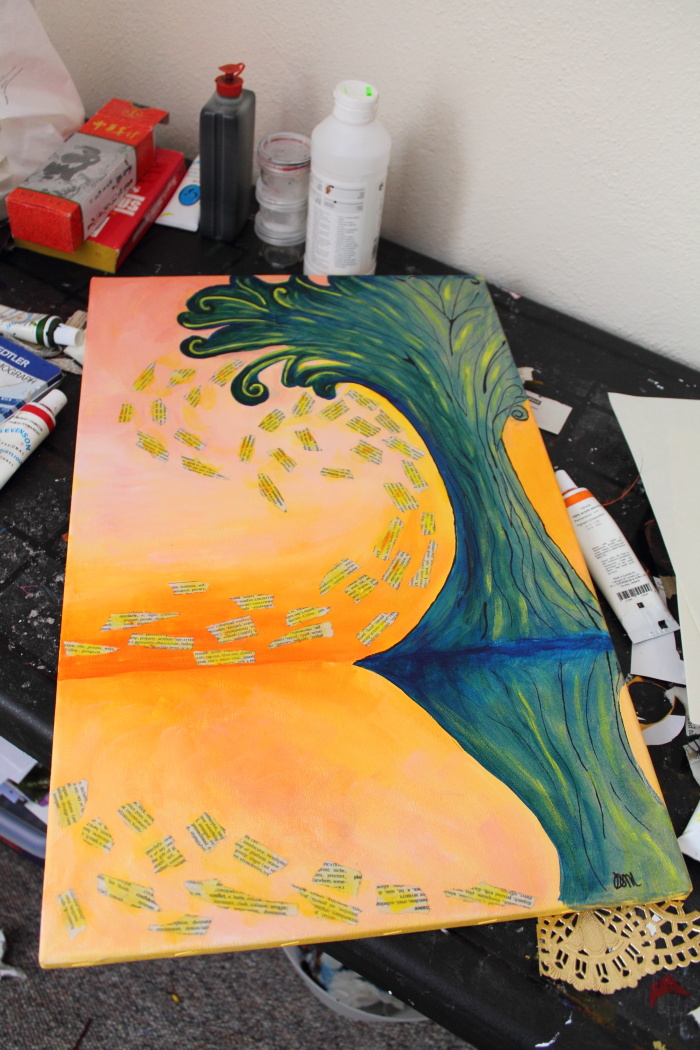My contribution to the Unfinished Painting Challenge
“A certain type of perfection can only be realized through a limitless accumulation of the imperfect.” ― Haruki Murakami, Kafka on the Shore
Yesterday I came across Lisa Congdon's Doodling Manifesto. In it she talks about the importance of making a mark just for its own sake, and how every creative thing we do - no matter how messy or imperfect - is important. It gets us closer to who we are and to who we want to be. This struck me as a really important point. To be creative, we must learn to be imperfect. And not just imperfect: we must learn to make awful, terrible, ugly work just for the sake of making something. The more we make, the better we get.
I often find myself butting up against this idea. I get caught thinking that I only have time to make stuff that meets my high standards, that's good enough to sell. Often playing and messing around feels like a giant waste of time.
Last weekend, a friend invited me to an event called Paint Nite, where you meet in a bar and follow instructions to create a painting from beginning to end, regardless of what kind of art experience you may have. The emphasis is that anyone can do it and that it doesn't matter how the painting turns out - you're just there to have fun with your friends and drink some wine. Maybe it was because my friends had high expectations of me, but I found myself thinking that my painting should turn out really well because I'm an "artist". I caught myself comparing my painting to the others and when the night was over I was ashamed to carry my painting home - I didn't want anyone to think that I had made it - while my friends proudly displayed their creations.
I'm not a painter. I've learned how to paint but it is not a form in which I am used to expressing myself. I went to see if I could learn anything from the instructor's teaching style, and to spend time with friends, not to create a masterpiece. And yet, I still felt bad about what I produced. For some reason, just making a painting to make a painting wasn't allowed.
I encounter a similar struggle when it comes to drawing, and I blame both on art classes that I took where the emphasis was on making everything look accurate and perfect. If the proportions in a drawing aren't exactly right I want to rip it up. I feel ashamed. When looking at other people's work, I'm much more drawn to drawings and paintings that aren't hyper-realistic, that let some of the artist's perceptions and personality shine through. So why can't I let myself do the same?
"Once executed, the idea will never be as good as it is in my mind? Toughen up. Leon Battista Alberti, the 15th century architectural theorist, said, 'Errors accumulate in the sketch and compound in the model.' But better an imperfect dome in Florence than cathedrals in the clouds.” ― Twyla Tharp, The Creative Habit: Learn It and Use It for Life
A few weeks before that night I made a painting for a project called the Unfinished Painting Challenge, where you drop off an unfinished painting for someone else to finish, and you finish someone else's work. It seemed like a great way to experiment with something new and I had a blast, both with creating something "unfinished" to bring in (because I don't paint, I don't have unfinished paintings lying around) and with transforming the painting that I brought home. I played with paint and colour in a way that I never really have before. There was no "right" answer, so there was no pressure.
This is why I started hosting crafting parties, because it takes the pressure off. It gives me an excuse to play and gives me permission to make terrible work. At these gatherings I've noticed that same voice that says my work should be high quality because this is what I DO. Thankfully, in these situations, I've learned to ignore that voice and to plunge headlong into one piece after another (usually Christmas ornaments or Easter eggs, depending on the season).
In these cases I find I usually make things really quickly and it feels like I'm rushing to escape from my inner critic. If I move fast enough it won't be able to catch me. And it works. I'm able to avoid getting caught up in whether what I produce is pretty or not. It's more important that I did it, I learned something, and now I can move on to the next idea. This creative frenzy means that the process is just as much fun as the product - if not more.
The Draw Paint Print experiment is another way that I'm deliberately introducing the idea of imperfection into my creative practice. I can't spend hours perfecting each exercise, and I don't want to. I want to do everything quickly, acting on impulse, and throwing something together so I can get to the next exercise.
Obviously this is not a good way to develop or deepen a skill, but it is a good way to practice creativity, to generate ideas, and to break out of your comfort zone. Sometimes I worry that if I experiment too much I will never get good at anything. I already feel like I'm a professional dabbler, and have a hard time calling myself an artist. I don't devote myself to learning a craft. I just mess around and see what works.
In the end though, this messing around always seems to lead to something better than I expected. I have to produce a lot of mess to get something beautiful, but it's almost always worthwhile.
In the spirit of the Doodling Manifesto, here is my (slapdash and imperfect) Imperfection Manifesto:
- There is value in every mark we make. We learn from it and it leads us, somehow, to the next one.
- Make lots of terrible things. It's the only way to start making good things.
- Listen to your inner critic. Then stick your tongue out at her and make something you know she wouldn't like.
- Be defiant. Don't let anyone tell you what's right or what's wrong.
- Smile in the face of awful art.
- Make something, anything, just for the wild pleasure of movement, of transformation. Expect nothing from it.
- Take what you can, burn the rest, move on to the next.
“True perfection seems imperfect, yet it is perfectly itself. True fullness seems empty, yet it is fully present.
True straightness seems crooked. True wisdom seems foolish. True art seems artless.” ― Lao Tzu, Tao Te Ching


